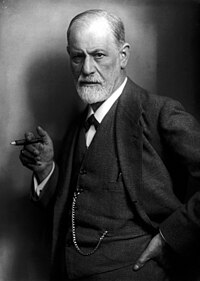Sigmund Freud
From Wikipedia, the free encyclopedia
"Freud" redirects here. For other uses, see Freud (disambiguation).
| Sigmund Freud | |
|---|---|
 Sigmund Freud, by Max Halberstadt, 1921 | |
| Born | Sigismund Schlomo Freud 6 May 1856 Freiberg in Mähren, Moravia(now part of the Czech Republic), Austrian Empire |
| Died | 23 September 1939 (aged 83) London, England, UK |
| Residence | Austria |
| Nationality | Austrian |
| Fields | Neurology Psychotherapy Psychoanalysis |
| Institutions | University of Vienna |
| Alma mater | University of Vienna |
| Known for | Psychoanalysis |
| Influences | Aristotle, Brentano, Breuer,Charcot, Darwin, Dostoyevsky,Goethe, Haeckel, Hartmann,Jackson, Jacobsen, Kant,Mayer, Nietzsche, Plato,Schopenhauer, Shakespeare,Sophocles |
| Influenced | Eugen Bleuler, John Bowlby,Viktor Frankl, Anna Freud, Erich Fromm, Otto Gross, Karen Horney, Arthur Janov, Ernest Jones, Carl Jung, Melanie Klein,Jacques Lacan, Fritz Perls, Otto Rank, Wilhelm Reich |
| Notable awards | Goethe Prize Foreign Member of the Royal Society (London)[1] |
| Signature | |
| Part of a series of articles on |
| Psychoanalysis |
|---|

Most of psychoanalysis forms around the use of a sofa for the patient where the psychologist is behind the patient.
|
| Psychology portal |
Sigmund Freud (German pronunciation: [ˈziːkmʊnt ˈfʁɔʏt]), born Sigismund Schlomo Freud (6 May 1856 – 23 September 1939), was an Austrian neurologist who founded the discipline of psychoanalysis. Freud's family and ancestry were Jewish. Freud always considered himself a Jew even though he rejected Judaism and had a critical view of religion.[2] Freud's parents were poor, but ensured his education. Freud was an outstanding pupil in high school, and graduated the Matura with honors in 1873. Interested in philosophy as a student, Freud later turned away from it and became a neurological researcher into cerebral palsy, Aphasia and microscopic neuroanatomy.
Freud went on to develop theories about the unconscious mind and the mechanism of repression, and established the field of verbal psychotherapy by creating psychoanalysis, a clinical method for treating psychopathology through dialogue between a patient (or "analysand") and a psychoanalyst. Though psychoanalysis has declined as a therapeutic practice, it has helped inspire the development of many other forms of psychotherapy, some diverging from Freud's original ideas and approach. Freud postulated the existence of libido (an energy with which mental process and structures are invested), developed therapeutic techniques such as the use of free association (in which patients report their thoughts without reservation and make no attempt to concentrate while doing so), discovered the transference (the process by which patients displace on to their analysts feelings based on their experience of earlier figures in their lives) and established its central role in the analytic process, and proposed that dreams help to preserve sleep by representing as fulfilled wishes that would otherwise awake the dreamer. He was also a prolific essayist, drawing on psychoanalysis to contribute to the interpretation and critique of culture.
Freud's theories have been criticized as pseudo-scientific[3] and sexist,[4] and they have been marginalized within psychology departments, although they remain influential within the humanities.[5] Critics have debated whether it is possible to test Freudian theories.[6] Some researchers claim evidence exists for some of Freud's theories.[7] Freud has been called one of the three masters of the "school of suspicion", alongside Karl Marx and Friedrich Nietzsche,[8] while his ideas have been compared to those of Plato[9] and Aquinas.[10]


कोई टिप्पणी नहीं:
एक टिप्पणी भेजें